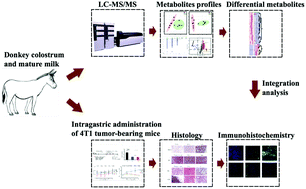Donkey milk inhibits triple-negative breast tumor progression and is associated with increased cleaved-caspase-3 expression†
Abstract
Donkey milk is considered an ideal substitute for human milk and is considered a potential complementary dairy product for the treatment of a variety of human diseases, including cancer. The purpose of this study was to investigate the inhibitory effect of donkey colostrum (DC) and mature milk (DM) on 4T1 triple-negative breast cancer (TNBC) tumors in mice. Metabolomics analyses showed that a total of 476 possible metabolites were found in both types of milk. Among them, 34 differential metabolites were identified, including 25 up-regulated and 9 down-regulated metabolites in the DC compared with DM. Both DC and DM are rich in many known anticancer constituents. The inhibitory effects of DC and DM on 4T1 primary tumors and the relative organ weight of the liver and lungs were determined by measuring the volume of primary tumors and weighing the liver and lungs. Both DC and DM significantly reduced both the primary tumor size and relative organ weight of the liver and lungs in 4T1 mice without affecting the bodyweight of mice. When the expression of cleaved caspase-3, Bax, and MMP2 was investigated by immunohistochemistry, the results showed that DC and DM inhibited the progression of 4T1 tumors by inducing the expression of cleaved-caspase-3 and Bax, and inhibiting the expression of MMP2 and CD31. Our data suggest that DC and DM inhibit the growth and metastasis of mouse 4T1 tumors by inducing apoptosis.



 Please wait while we load your content...
Please wait while we load your content...